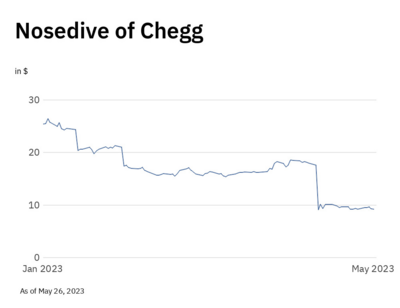
A business must adapt to the changing needs of changing times. Those that don't will inevitably perish. Take the case of AI. Many fear that if they don't adapt their business model to include AI, they will be left behind in the race.
And these fears might be justified. Here's why.
The downfall of Chegg
Chegg is an international edtech giant. And in 2022, it generated $767 million worth of revenue.
Not a small feat by any means. Yet, at present, the company's future looks grim.
Why?
In short, ChatGPT. Market participants are worried that ChatGPT's open AI has made Chegg's services obsolete.
Simply put, Chegg helps you do your homework. Say you are stuck on a question. Take a picture and upload it on Chegg, and voila, within minutes, you will have an answer.
But Open AI does all this and more. And it does it faster, better and for free. So you can understand why investors are fearful that Chegg is about to run out of business.
Even the company's CEO Dan Rosenweig stated that due to students' increased interest in ChatGPT, the company has been witnessing a slowdown in growth rate. The management also didn't give any revenue guidance for FY24 as they are unsure what FY24 holds in store. In addition, the company's revenue fell both year-on-year and sequentially in Q1 CY23.
Unsurprisingly, the share price has taken a hit. It has fallen by 64 per cent year-to-date and 49 per cent in the last month. On the day the company declared its Q4 results, it fell by a mind-boggling 48 per cent!
Adapt or perish
Chegg is the present example of the market's law of adapt or perish. History is ripe with companies that disappeared as they failed to adapt to technological changes.
- Hindustan Motors. The manufacturer of Ambassador and India's first automobile leader went bankrupt as it couldn't compete with the technologically superior cars of international players like Maruti Suzuki.
- Moser Baer. The once largest manufacturer of CDs and DVDs went bankrupt as compact disks became obsolete.
On the other end of the spectrum, you have companies that experienced a meteoric rise because they adapted to new technology and enhanced their business models.
- Fujifilm. While its competitor Kodak refused to get with the times, Fujifilm recognised that digital photography was the future, moved away from analogue photography, and started selling digital cameras. Today, Fujifilm is one of the leading camera manufacturers, while Kotak has gone bankrupt.
- Netflix. Everyone knows the famous story of Netflix and Blockbuster. Blockbuster was on the verge of purchasing Netflix in the early 2000s. But it decided not to go forward with the deal as it felt no one would be interested in renting content online. Today, Netflix is the world's go-to for content, while Blockbuster has receded to nostalgia.
Key takeaway
Chegg and the others listed above are prime examples of why businesses must adapt to technological changes. AI indeed poses a significant threat to various business models. But so did personal computers when they were first introduced. Yet many businesses thrived after the advent of computers.
Thus, as an investor, you should always inquire if a company is adopting technological changes. Long-term wealth creation is only possible if your businesses adapt to evolving needs.
Also read: Understanding before investing









